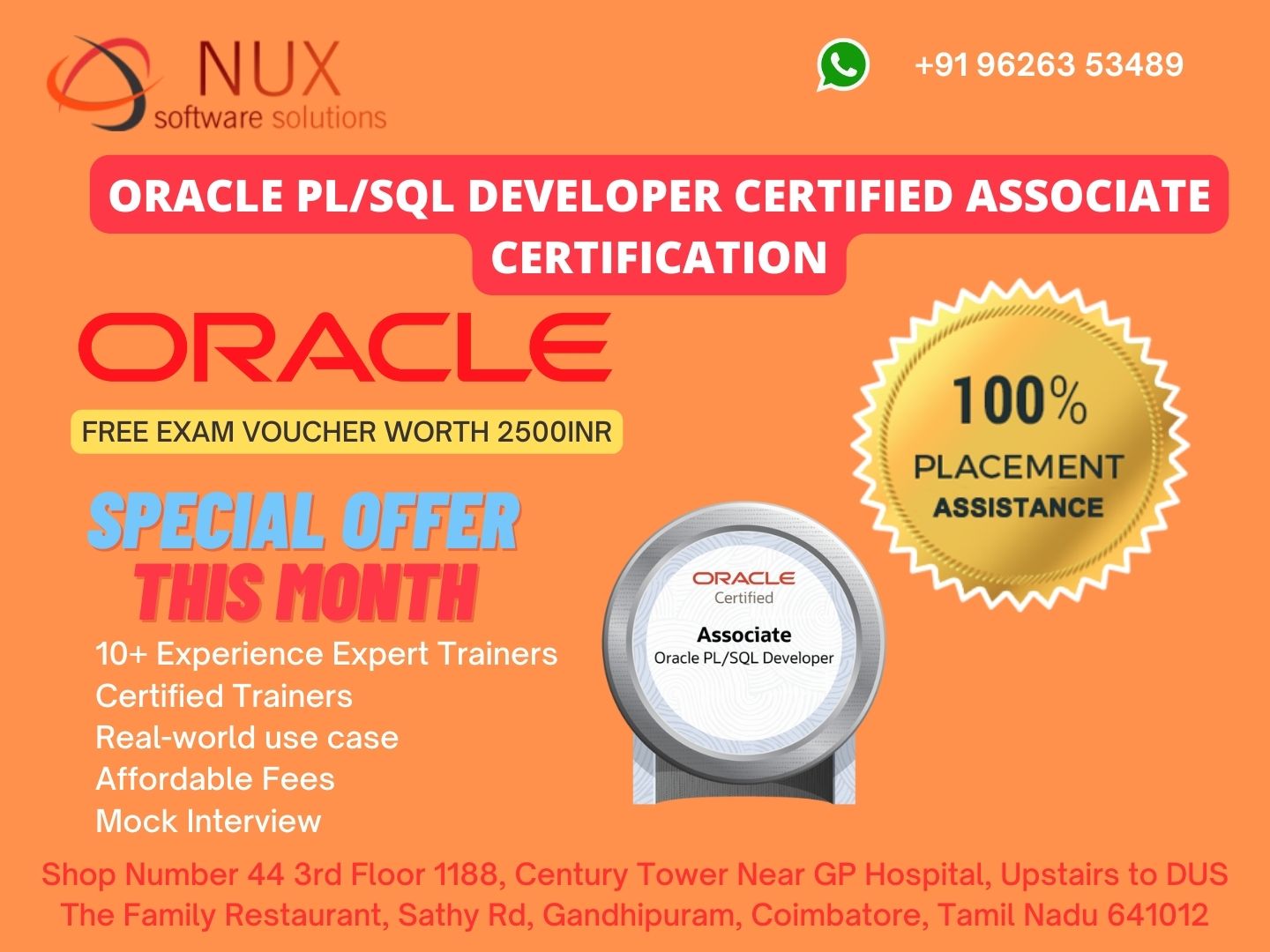Oracle PL/SQL Developer Certified Associate

Course Summary
This comprehensive training program prepares professionals to become Oracle PL/SQL Developer Certified Associates, focusing on developing stored procedures, functions, packages, triggers, and managing programmatic database access in Oracle environments. The course is built around Oracle’s 1Z0-149 certification exam, which validates a developer’s skills in writing efficient and secure PL/SQL code to interact with Oracle databases.
With hands-on practice, participants will learn to build modular, reusable, and optimized database-driven applications that are critical for enterprise systems across sectors like finance, manufacturing, healthcare, and logistics.
Why Choose This Course
PL/SQL is the foundation for advanced Oracle database development, enabling automation, business logic implementation, and secure data processing. This course helps you:
Develop real-world expertise in PL/SQL programming and Oracle data structures
Gain hands-on experience in writing secure, maintainable, and efficient PL/SQL code
Prepare thoroughly for the Oracle 1Z0-149 certification exam
Learn from industry-experienced instructors with deep Oracle application knowledge
Become proficient in using procedures, functions, cursors, and exception handling
Who Should Enroll
This course is ideal for:
Application developers building Oracle-based solutions
SQL developers and analysts moving into Oracle PL/SQL development
Professionals preparing for the Oracle PL/SQL Developer Certified Associate exam
Oracle DBAs who want to expand into PL/SQL scripting and program development
Organizations automating business logic within Oracle environments
Skills You Will Gain
Mastery of PL/SQL programming fundamentals including syntax, variables, and data types
Creating procedures, functions, packages, and triggers for business applications
Writing and managing explicit and implicit cursors
Implementing exception handling for secure application logic
Using dynamic SQL, bulk operations, and compiler features for performance
Applying PL/SQL best practices for modularity, reusability, and maintainability
Career Benefits
After completing this course, you will:
Be fully prepared to pass the Oracle 1Z0-149 PL/SQL Developer Associate exam
Qualify for roles such as Oracle Developer, PL/SQL Programmer, or Database Application Engineer
Gain in-demand skills that support ERP systems, banking platforms, healthcare apps, and more
Boost your credentials as a developer supporting mission-critical enterprise systems
Lay the groundwork for advanced Oracle certifications like OCP – Advanced PL/SQL Developer
Power Enterprise Development with Oracle PL/SQL
From backend logic to performance-optimized procedures, PL/SQL is essential for Oracle application development. This training gives you the tools and credentials to deliver secure, scalable solutions across domains.
Start your PL/SQL journey with expert-led training at Linux Training Center.
Course Syllabus
Modules
- Introduction to PL/SQL
- Explain the need for PL/SQL
- Explain the benefits of PL/SQL
- Identify the different types of PL/SQL blocks
- Output messages in PL/SQL
- Declaring PL/SQL Variables
- Recognize valid and invalid identifiers
- List the uses of variables, declare and initialize variables, use bind variables
- List and describe various data types using the %TYPE attribute
- Writing Executable Statements
- Identify lexical units in a PL/SQL block
- Use built-in SQL functions in PL/SQL and sequences in PL/SQL expressions
- Describe when implicit conversions take place and when explicit conversions have to be dealt with
- Write nested blocks and qualify variables with labels
- Write readable code with appropriate indentation
- Interacting with the Oracle Database Server
- Create PL/SQL executable blocks using DML and transaction control statements
- Make use of the INTO clause to hold the values returned by a SQL statement
- Writing Control Structures
- Identify the uses and types of control structures (IF, CASE statements and expressions)
- Construct and identify loop statements
- Apply guidelines when using conditional control structures
- Working with Composite Data Types
- Create user-defined PL/SQL records
- Create a record with the %ROWTYPE attribute
- Create an INDEX BY table and INDEX BY table of records
- Describe the differences among records, tables, and tables of records
- Using Explicit Cursors
- Distinguish between usage of implicit and explicit cursors, use SQL cursor attributes
- Declare and control explicit cursors, use simple loops and cursor FOR loops to fetch data
- Declare and use cursors with parameters
- Lock rows with the FOR UPDATE clause and reference the current row with the WHERE CURRENT OF clause
- Handling Exceptions
- Define PL/SQL exceptions
- Recognize unhandled exceptions
- Handle different types of exceptions (pre-defined exceptions, non-predefined exceptions and user-defined exceptions)
- Propagate exceptions in nested blocks and call applications
- Creating Stored Procedures and Functions
- Differentiate between anonymous blocks and subprograms
- Create a simple procedure and invoke it from an anonymous block
- Create a simple function
- Create a simple function that accepts a parameter
- Differentiate between procedures and functions
MODULE 2 :
Oracle Database 11g: Develop PL/SQL Program Units
- Creating Procedures
- Differentiate between anonymous blocks and subprograms, use a modularized and layered subprogram design, and identify the benefits of subprograms
- Create a simple procedure and invoke it from an anonymous block
- Work with procedures
- Handle exceptions in procedures, remove a procedure, and display a procedure's information
- Creating Functions
- Differentiate between a procedure and a function
- Describe the uses of functions
- Work with functions (create, invoke and remove functions)
- Creating Packages
- Identify the benefits and the components of packages
- Work with packages (create package specification and body, invoke package subprograms, remove a package and display package information)
- Working with Packages
- Overload package subprograms, use forward declarations
- Create an initialization block in a package body
- Manage persistent package data states for the life of a session and use PL/SQL tables and records in packages
- Using Oracle-Supplied Packages in Application Development
- Describe how the DBMS_OUTPUT package works
- Use UTL_FILE to direct output to operating system files
- Describe the main features of UTL_MAIL
- Using Dynamic SQL
- Describe the execution flow of SQL statements
- Use Native Dynamic SQL (NDS)
- Use the DBMS_SQL package
- Design Considerations for PL/SQL Code
- Create standard constants and exceptions
- Write and call local subprograms
- Control the run-time privileges of a subprogram
- Perform autonomous transactions
- Use NOCOPY hint, PARALLEL ENABLE hint and DETERMINISTIC clause
- Use bulk binding and the RETURNING clause with DML
- Creating Triggers
- Describe different types of triggers and their uses
- Create database triggers
- Manage triggers
- Creating Compound, DDL, and Event Database Triggers
- Create triggers on DDL statements
- Create triggers on system events
- Using the PL/SQL Compiler
- Describe the new PL/SQL compiler and features
- Use the new PL/SQL compiler initialization parameters
- Use the new PL/SQL compile time warnings
- Managing PL/SQL Code
- Describe and use conditional compilation
- Hide PL/SQL source code using dynamic obfuscation and the Wrap utility
- Managing Dependencies
- Track and manage procedural dependencies



